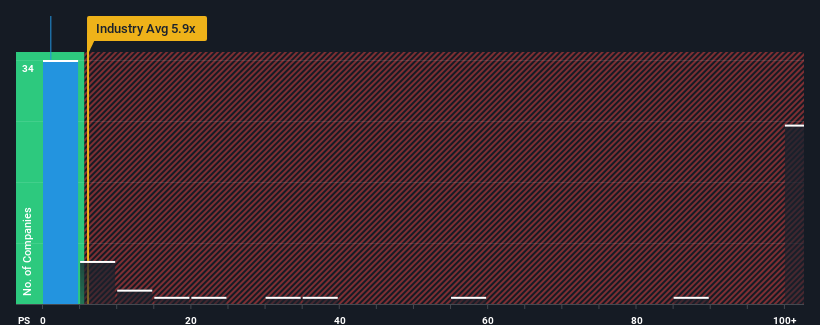- Australia
- /
- Oil and Gas
- /
- ASX:AJQ
The Market Doesn't Like What It Sees From Armour Energy Limited's (ASX:AJQ) Revenues Yet As Shares Tumble 33%
The Armour Energy Limited (ASX:AJQ) share price has fared very poorly over the last month, falling by a substantial 33%. For any long-term shareholders, the last month ends a year to forget by locking in a 64% share price decline.
After such a large drop in price, Armour Energy's price-to-sales (or "P/S") ratio of 1x might make it look like a strong buy right now compared to the wider Oil and Gas industry in Australia, where around half of the companies have P/S ratios above 5.9x and even P/S above 943x are quite common. However, the P/S might be quite low for a reason and it requires further investigation to determine if it's justified.
See our latest analysis for Armour Energy

What Does Armour Energy's P/S Mean For Shareholders?
For example, consider that Armour Energy's financial performance has been poor lately as its revenue has been in decline. It might be that many expect the disappointing revenue performance to continue or accelerate, which has repressed the P/S. However, if this doesn't eventuate then existing shareholders may be feeling optimistic about the future direction of the share price.
Although there are no analyst estimates available for Armour Energy, take a look at this free data-rich visualisation to see how the company stacks up on earnings, revenue and cash flow.Is There Any Revenue Growth Forecasted For Armour Energy?
The only time you'd be truly comfortable seeing a P/S as depressed as Armour Energy's is when the company's growth is on track to lag the industry decidedly.
Taking a look back first, the company's revenue growth last year wasn't something to get excited about as it posted a disappointing decline of 16%. The last three years don't look nice either as the company has shrunk revenue by 41% in aggregate. Accordingly, shareholders would have felt downbeat about the medium-term rates of revenue growth.
In contrast to the company, the rest of the industry is expected to grow by 0.5% over the next year, which really puts the company's recent medium-term revenue decline into perspective.
With this information, we are not surprised that Armour Energy is trading at a P/S lower than the industry. However, we think shrinking revenues are unlikely to lead to a stable P/S over the longer term, which could set up shareholders for future disappointment. Even just maintaining these prices could be difficult to achieve as recent revenue trends are already weighing down the shares.
What Does Armour Energy's P/S Mean For Investors?
Shares in Armour Energy have plummeted and its P/S has followed suit. It's argued the price-to-sales ratio is an inferior measure of value within certain industries, but it can be a powerful business sentiment indicator.
It's no surprise that Armour Energy maintains its low P/S off the back of its sliding revenue over the medium-term. Right now shareholders are accepting the low P/S as they concede future revenue probably won't provide any pleasant surprises either. Unless the recent medium-term conditions improve, they will continue to form a barrier for the share price around these levels.
We don't want to rain on the parade too much, but we did also find 5 warning signs for Armour Energy (4 shouldn't be ignored!) that you need to be mindful of.
If strong companies turning a profit tickle your fancy, then you'll want to check out this free list of interesting companies that trade on a low P/E (but have proven they can grow earnings).
New: Manage All Your Stock Portfolios in One Place
We've created the ultimate portfolio companion for stock investors, and it's free.
• Connect an unlimited number of Portfolios and see your total in one currency
• Be alerted to new Warning Signs or Risks via email or mobile
• Track the Fair Value of your stocks
Have feedback on this article? Concerned about the content? Get in touch with us directly. Alternatively, email editorial-team (at) simplywallst.com.
This article by Simply Wall St is general in nature. We provide commentary based on historical data and analyst forecasts only using an unbiased methodology and our articles are not intended to be financial advice. It does not constitute a recommendation to buy or sell any stock, and does not take account of your objectives, or your financial situation. We aim to bring you long-term focused analysis driven by fundamental data. Note that our analysis may not factor in the latest price-sensitive company announcements or qualitative material. Simply Wall St has no position in any stocks mentioned.
About ASX:AJQ
Armour Energy
Armour Energy Limited, together with its subsidiaries, focuses on the exploration, development, and production of oil and gas, and associated liquid resources in Australia.
Medium and slightly overvalued.
Similar Companies
Market Insights
Community Narratives



